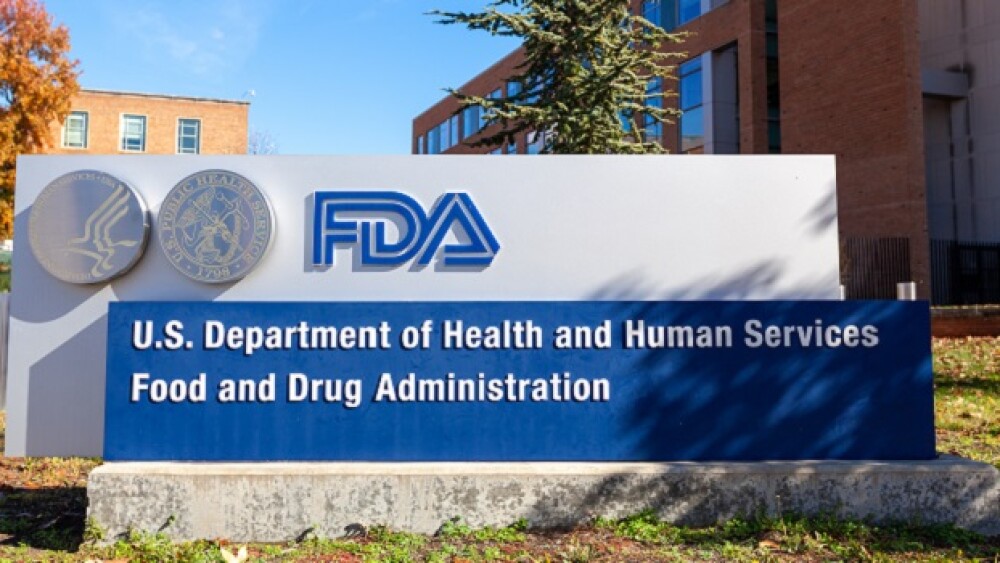Regeneron envisions new dosing for Eylea’s label and it’s the moment of truth for BioMarin’s gene therapy for hemophilia A. For that and more, see inside.
Pictured: FDA sign with blue sky background/Adobe Stock, Grandbrothers
The FDA will close the month of June with four target action dates, including one for an investigational gene therapy for a rare disease and another for an already top-selling eye disease treatment.
Eton Proposes Injection for Methanol Poisoning
The FDA is set to release its verdict June 27 for Eton Pharmaceuticals’ dehydrated alcohol injection, which the company is proposing as a treatment for methanol poisoning.
Eton first submitted an NDA for the dehydrated alcohol injection in July 2020, which the FDA accepted in October of the same year. The company has yet to provide much data regarding the injection’s efficacy and safety, but in its submission Eton said the investigational product had previously been granted the FDA’s Orphan Drug designation.
In March 2021, the FDA rejected Eton’s NDA. In its Complete Response Letter, the regulator indicated that travel restrictions due to the COVID-19 pandemic prevented a timely inspection of the company’s European contract manufacturing site.
In its third-quarter 2021 financial report, Eton stated it “believes the FDA’s requests are fully addressable, and the company expects to submit its response as an amendment in the coming months.” The FDA accepted Eton’s resubmission in January 2023.
If approved, Eton expects the dehydrated alcohol injection to have seven years of market exclusivity.
Regeneron Envisions New Dosing for Eylea’s Label
Regeneron is seeking to add a higher 8-mg dose to Eylea (aflibercept)’s label for the treatment of wet age-related macular degeneration (wAMD), diabetic retinopathy and diabetic macular edema (DME).
The FDA accepted the company’s BLA in February 2023 and, because Regeneron used its priority review voucher, is set to release its decision on June 27.
Eylea is a recombinant fusion protein that works by blocking both the VEGF-A and PLGF growth factors, preventing the development of new blood vessels in the eye. The injection was first approved in 2011 for wAMD.
In its current wAMD label, Eylea is administered as a 2-mg intravitreal injection every four weeks for the first three months and every eight weeks thereafter. For DME and diabetic retinopathy, Eylea is dosed at 2 mg every four weeks.
In its BLA, Regeneron presented data from the pivotal PULSAR and PHOTON trials in wAMD and DME, respectively, showing that the investigational 8-mg dose given at 12- and 16-week dosing regimens yielded non-inferior vision outcomes compared to the current 8-week schedule. The proposed dosing regimen also did not pose any new safety concerns.
Amneal Seeks Approval for Extended-Release Parkinson’s Drug
The FDA has a target action date of June 30 for Amneal Pharmaceuticals’ IPX203, the company’s extended-release carbidopa/levodopa (CD/LD) capsules, being proposed for the treatment of Parkinson’s disease.
CD/LD is a well-known drug combination in Parkinson’s. Levodopa is a precursor of dopamine and is metabolized into the neurochemical once ingested. Increasing the concentrations of dopamine in the brain could help improve movement and coordination, which are often impaired in Parkinson’s. Combining levodopa with carbidopa helps to reduce nausea and improve its absorption into the central nervous system.
Amneal’s IPX203 is a novel oral formulation of the CD/LD combination that uses immediate-release granules containing both drugs, as well as extended-release beads that carry only levodopa.
In its NDA, accepted by the regulator in November 2022, Amneal supported IPX203 with data from the RISE-PD trial, a multicenter, randomized, double-blinded and active-controlled trial comparing slow-release CD/LD with an immediate-release treatment regimen.
RISE-PD found that even when dosed less frequently, Amneal’s extended-release capsules resulted in significantly longer “Good On” time, defined as the total time without dyskinesia.
Moment of Truth for BioMarin’s Hemophilia Gene Therapy
After enduring a three-month delay, BioMarin will receive the FDA’s verdict regarding its investigational gene therapy Roctavian (valoctocogene roxaparvovec) for hemophilia A on June 30.
Hemophilia A is an X-linked genetic disorder caused by a faulty or missing clotting protein called factor VIII. In severe forms, hemophilia A can lead to spontaneous bleeding in muscles and joints. Roctavian uses an adeno-associated virus vector to deliver a shorter and functional copy of the gene that encodes for factor VIII.
BioMarin first submitted a BLA for Roctavian in February 2020 and received the FDA’s Priority Review designation. The regulator, however, turned the application down in August of the same year, citing a lack of long-term follow-up data.
The California biotech resubmitted the BLA in September 2022 and included two-year results from the Phase III GENEr8-1 study, along with five years’ worth of follow-up data from an ongoing Phase I/II dose escalation study. These findings demonstrate that the gene therapy achieved “stable and durable bleed control,” according to a news release at the time.
BioMarin is also proposing a long-term extension trial, running for up to 15 years, along with two other post-approval registry studies.
If approved, Roctavian would become the first gene therapy for hemophilia A authorized in the U.S. Roctavian was approved in the European Union in August 2022.
Tristan Manalac is an independent science writer based in metro Manila, Philippines. He can be reached at tristan@tristanmanalac.com or tristan.manalac@biospace.com.






